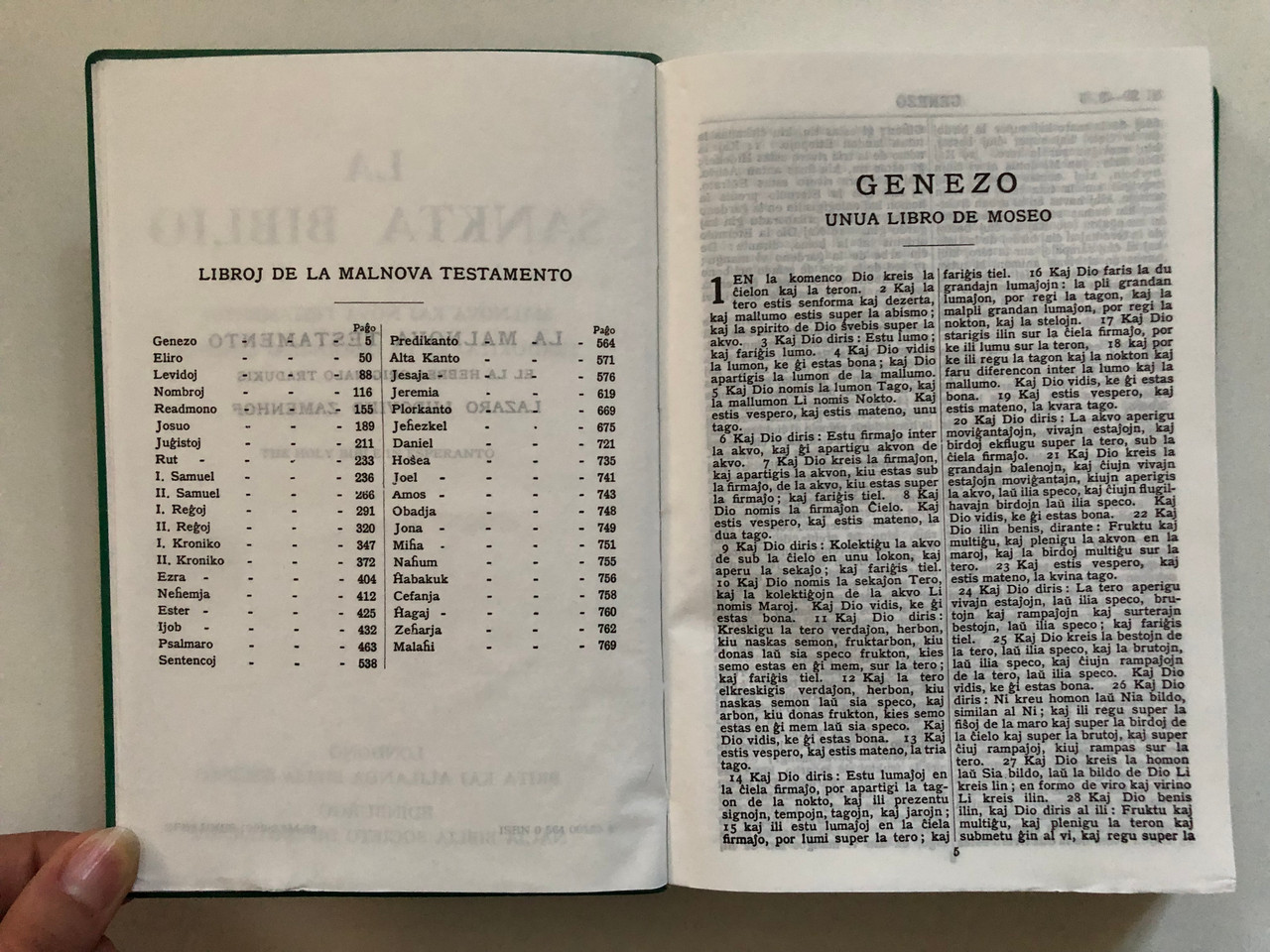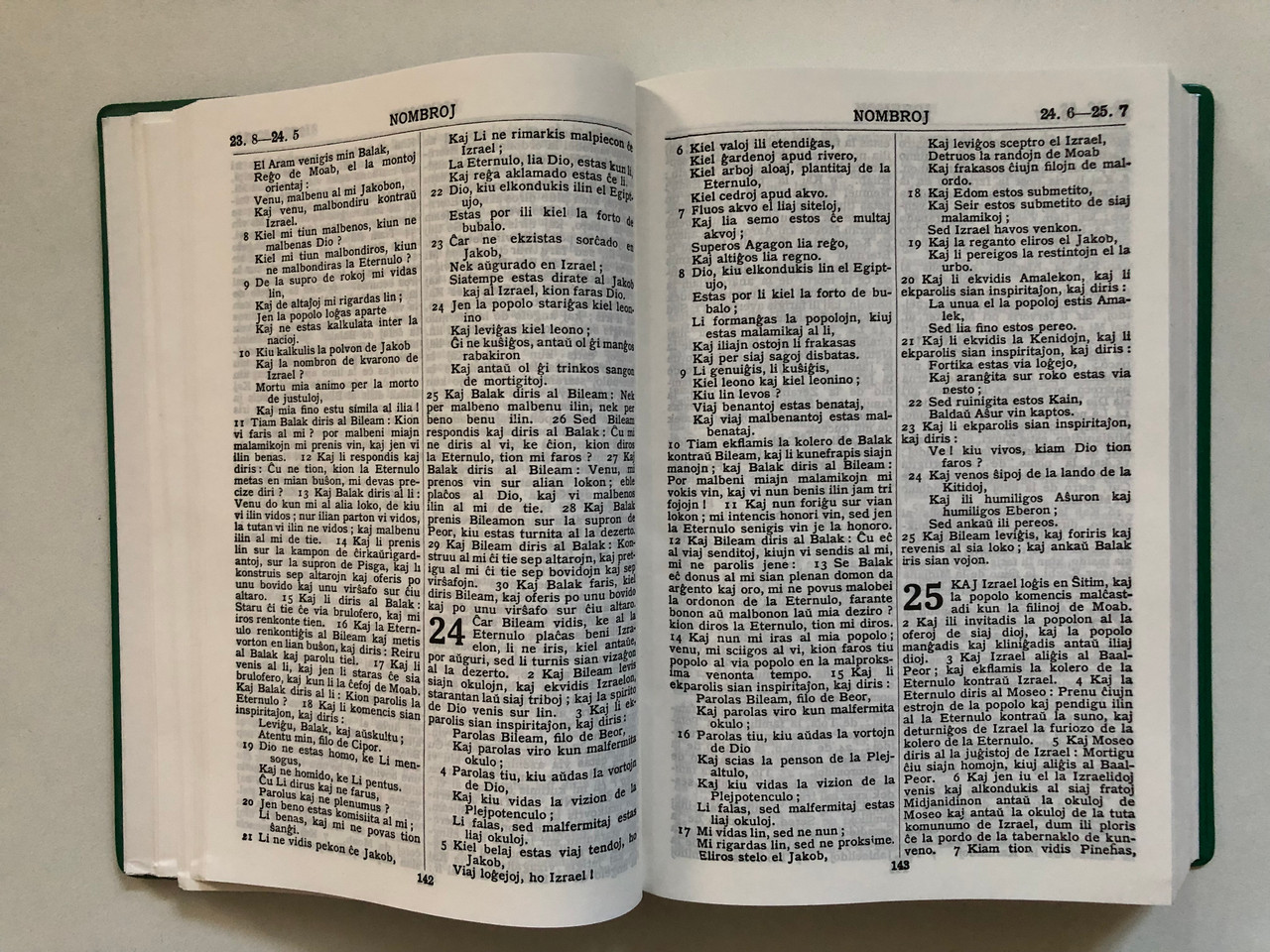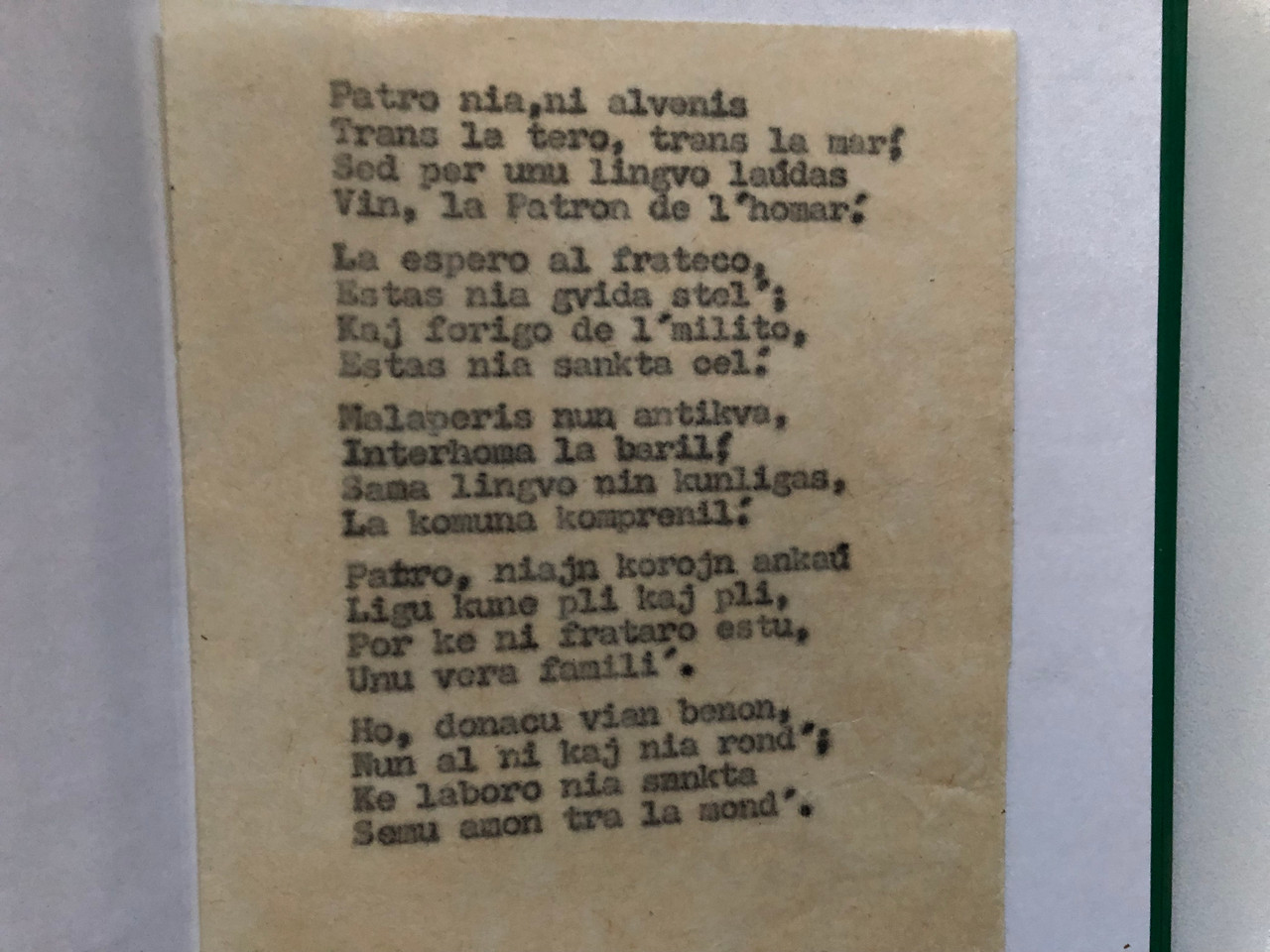Description
La Sankta Biblio | The Holy Bible in Esperanto
Product Information
- Catalog Number: BFBS-HEB5-1990-25M
- UPC: 64 00138 4
- Product Type: Religious Text/Holy Bible
- Language: Esperanto
- Format: Hardcover Book
- Number of Pages: 996 (771 pages for Old Testament, 225 pages for New Testament)
- Publication Date: 1990 Edition (Original translation dates to earlier editions)
- Publisher: Brita kaj Alilanda Biblia Societo (British and Foreign Bible Society) and Nacia Biblia Societo de Skotlando (National Bible Society of Scotland)
- Translator: Lazaro Ludoviko Zamenhof (Old Testament), unspecified translators (New Testament)
- Original Languages: Hebrew (Old Testament), Greek (New Testament)
Overview
"La Sankta Biblio" is the complete Holy Bible translated into Esperanto, the international auxiliary language created by L.L. Zamenhof. This edition contains both the Old Testament ("La Malnova Testamento") and the New Testament ("La Nova Testamento"), faithfully rendered from the original Hebrew and Greek texts. The Old Testament was translated by L.L. Zamenhof himself, the creator of Esperanto, making this work not only a religious text but also a significant historical and linguistic document. This edition represents the fulfillment of Zamenhof's vision for Esperanto as a bridge between cultures and religions, providing access to sacred texts in a neutral, international language designed for global communication and understanding.
Product Features
- Complete Bible: Contains all 66 canonical books of the Protestant Bible
- Original Translation: Old Testament translated directly from Hebrew by Esperanto's creator
- Historical Significance: Represents an important work in Esperanto literature
- Table of Contents: Detailed listing of all books with page numbers
- Clear Typography: Readable font with verse numbers for easy reference
- Dual-Column Format: Efficient layout for reading and study
- Durable Binding: Hardcover designed for long-term use
- Chapter Headings: Clear organization of biblical texts
- Language Purity: Exemplifies classical Esperanto style from the language's creator
- Cultural Importance: Bridges religious texts with the international language movement
Interesting Facts
Zamenhof's Biblical Contribution
L.L. Zamenhof, the creator of Esperanto, personally translated the entire Old Testament from Hebrew into Esperanto. As a Jewish ophthalmologist born in Białystok (then part of the Russian Empire), Zamenhof possessed deep knowledge of Hebrew texts and religious traditions. His work on "La Sankta Biblio" demonstrates not only his linguistic genius but also his commitment to making foundational texts of human civilization accessible across language barriers. Zamenhof saw Esperanto not merely as a communication tool but as a vehicle for promoting understanding between different cultures and religions. His translation of the Bible represents one of the most significant early literary achievements in the Esperanto language, helping to establish its expressive capabilities and religious vocabulary.
The Genesis Passage
The book opens with the famous lines of Genesis rendered in Esperanto: "En la komenco Dio kreis la ĉielon kaj la teron" ("In the beginning God created the heaven and the earth"). This demonstrates how biblical concepts were carefully translated into Esperanto while maintaining fidelity to the original text. The Creation account continues with descriptions of light ("lumo"), water ("akvo"), and the formation of earth and sky, showcasing Zamenhof's ability to convey complex religious and cosmological concepts in his constructed language. The Genesis passages included in the sample pages reveal the rhythmic quality and clarity that Zamenhof achieved in his translation, making the biblical narrative accessible to speakers of this international auxiliary language.
Esperanto's Religious Dimension
While Esperanto is often associated with internationalist and humanist movements, "La Sankta Biblio" highlights the language's important religious dimension. From its early days, Esperanto has been used for religious purposes across different faiths. This Bible translation played a crucial role in developing Esperanto's religious lexicon and establishing it as a language capable of expressing spiritual concepts with precision and dignity. Today, religious Esperanto speakers include Christians of various denominations, particularly among Protestant groups who emphasized Bible translation into vernacular languages. There are also active Esperanto-speaking religious communities that use this translation for worship, study, and devotional purposes.
The Esperanto Prayer
The book includes the text of "Patro Nia" ("Our Father"), a prayer that reflects the idealistic vision behind both Christianity and the Esperanto movement. The prayer emphasizes unity across geographical boundaries with lines such as "ni alvenis trans la tero, trans la mar'" ("we have come across land, across sea") and "per unu lingvo laŭdas Vin" ("with one language praise You"). It speaks to fraternity as a guiding star ("La espero al frateco, estas nia gvida stel'") and the elimination of war as a sacred goal ("Kaj forigo de l'milito, estas nia sankta cel'"). The prayer beautifully encapsulates Zamenhof's hope that a common language would break down barriers between peoples ("Malaperis nun antikva, interhoma la baril', sama lingvo nin kunligas, la komuna komprenil'"), creating one true family of humanity united in understanding.
Publishers
Published jointly by the British and Foreign Bible Society (Brita kaj Alilanda Biblia Societo) and the National Bible Society of Scotland (Nacia Biblia Societo de Skotlando), with offices in London (Londono), Edinburgh (Edinburgo), and Glasgow (Glasgovo). This 1990 edition represents continued commitment to making Biblical texts available in Esperanto for the international community of speakers.
We value your feedback! Share your experience with this product to help others make informed decisions. Your review is important to us!
Hashtags
#Esperanto #SanktaBiblio #ZamenhofTranslation #EsperantoBible #InternationalBible #BiblicalTranslation #ConstructedLanguage #ReligiousText #EsperantoLiterature #SacredTexts





















































